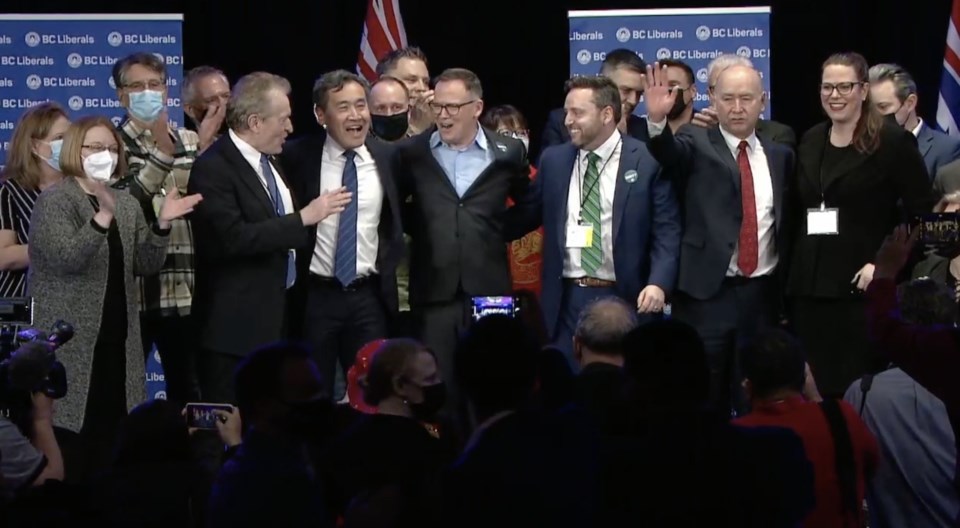In any political campaign, there are tactics and strategies and messaging and plans and promises. But after voting day, there are only numbers.
And the numbers don’t lie. The numbers are the hard truth: either what you did worked, or it didn’t.
Over the coming days and weeks, there will be a lot of digging into the riding-by-riding results from Saturday’s BC Liberal leadership vote. I’m looking forward to hearing what people take away from it, what interesting snapshots we can develop.
You can download the numbers for yourself HERE but here are the things I’m pondering after my first look:
This wasn’t close.
On the first ballot, Kevin Falcon led in 62 of 87 ridings; Ellis Ross in 21. On the final ballot, Falcon won 62, Ross 21, and Michael Lee 3 (Ross and Falcon tied in Kelowna West).
Surrey went full Falcon, and that’s where he won this thing.
In 2011, the Falcon leadership team focused too much on the Surrey ridings, and got beat by Christy Clark in other areas across the province. This became a warning to other campaigns to not over-invest in one region. Unfortunately for the other six campaigns, they all but vacated Surrey to Falcon, allowing him to run up massive wins—82% in Surrey-Cloverdale, 88% in Surrey-Fleetwood, 86.5% in Surrey-Green Timbers, 68% in Surrey-Guildford, 89% in Surrey-Newton, 88% in Surrey-Panorama, 79% in Surrey South, 89% in Surrey-Whalley, 66% in Surrey-White Rock.
These nine ridings resulted in a 650 point head start for Falcon over Ross, a massive gap. Throw in the two Langley ridings, and those 11 results gave Falcon more than half his victory margin. He just had to be competitive everywhere else, which he was – see below.
Falcon was fine everywhere.
On the first ballot, he didn’t finish lower than third anywhere. In fact, in only two ridings (Kootenay West and Vancouver Hastings) did he finish something other than first or second. He collected points all over B.C.
Where you’re from matters.
Renee Merrifield’s only first-ballot riding win was her own riding of Kelowna Mission. Michael Lee won only his Vancouver-Langara riding, and tiny Kootenay West, which had fewer than 100 voters. Gavin Dew’s only riding win was Vancouver-Mount Pleasant, where he had been a no-hope BC Liberal byelection candidate in 2016.
The Big Blue Wall wanted Falcon.
One of the most troubling outcomes for the BC Liberals in 2021 were the losses in the formerly reliable Big Blue Wall communities of eastern Surrey, Langley, Abbotsford, Chilliwack, and Maple Ridge. Falcon won all those ridings on the final ballot. He won Richmond too, another fallen stronghold.
Members felt Falcon was the one best positioned to win in the Lower Mainland. Ross won only two Lower Mainland ridings: New Westminster and Vancouver Hastings. There had been a lot of debate among members about whether a northern politician like Ross could resonate in Metro Vancouver.
Ross did very well on Vancouver Island.
He won nine ridings on the Island, a place too many BC Liberals have all but given up on. He also won two of the three Kelowna ridings, once Merrifield dropped off the ballot.
How about some Stan Sipos facts to annoy my friend Katy Merrifield?
On his only ballot, Sipos beat Merrifield in 15 ridings, Dew in eight, Lee in three, and Val Litwin in two.
There were some shutouts.
Sipos failed to get a single vote in 17 ridings; Merrifield in six, and Litwin in 3.
One-quarter of all voters ranked all seven candidates.
Of the 24,083 total ballots cast, 6,020 had seven choices, and another 218 had six (which means they ranked everyone too). Nearly 45 per cent of voters only selected one candidate.
Those are my early takeaways – stay tuned for more.
Jordan Bateman has a long history of public policy work, championing small business and fiscal responsibility. Currently the Vice President, Communications & Marketing for the Independent Contractors and Business Association (ICBA), Jordan also served six years as the B.C. Director of the Canadian Taxpayers Federation, and was a two-term Langley Township Councillor.



